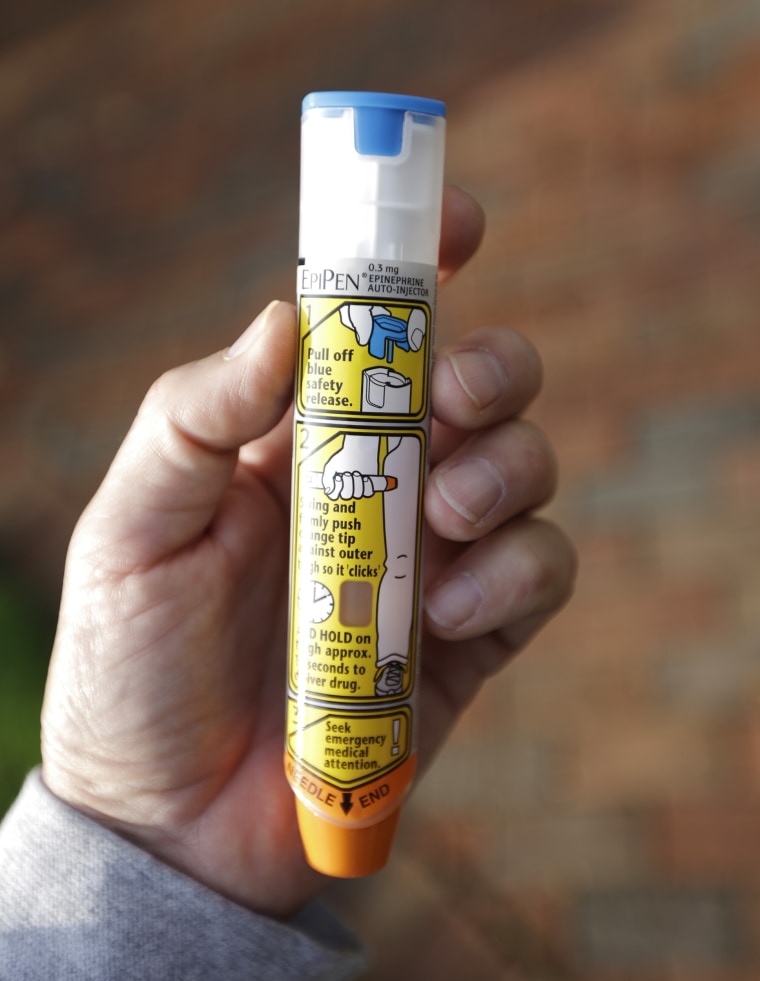The cost of saving your child's life has gotten a lot more expensive.
Parents getting ready for back-to-school season have another item to toss in the basket along with Trapper Keepers and boxes of pencils — and they're facing sticker shock at the latest price increase.
Doctors and patients say the Mylan pharmaceutical company has jacked up the prices for an EpiPen — the portable device that can stop a potentially life-threatening allergic reaction — from around $100 in 2008 to $500 and up today.
That's a hike of over 400 percent.
Mylan didn't invent the EpiPen, it acquired it in 2007, getting a drug that had been approved since 1987 and had 90 percent market dominance. Nor does it manufacture the EpiPen itself. Mylan buys it from a wholly owned Pfizer subsidiary for $34.50 per pen.
Then in 2009, Mylan launched an upgraded device. A medical device technology expert and a doctor who took apart the "before" and "after" versions of the EpiPen found that despite safety and graphics upgrades, the auto-injectors shared a similar "core."
Now former pharmaceutical executive Martin Shkreli has weighed in, calling the Mylan company "vultures."
U.S. Senators are scrutinizing the price hikes, with one calling for an FTC probe. Connecticut Senator Richard Bluemnthal, who pushed for emergency epinephrine to be stocked in public schools, pledged Friday to investigate the "shocking increase."
UPDATE: On 9/21/16, the House Oversight Committee grilled Mylan and the FDA in a hearing on the EpiPen price hike.
"Patients are calling and saying they can't afford it," said Dr. Douglas McMahon, an allergy specialist in Maplewood, Minnesota. "They're between a rock and a hard place."
Following a recall by Mylan's chief competitor last year, the company now enjoys a near monopoly.
Because of aggressive marketing and branding campaigns, and lobbying for legislation that requires the product to be stocked in schools, they have a brand dominance equal to that of Kleenex, doctors say.
About the size of a fat marker, they are carried by many parents of kids with severe allergies wherever they go — ready to jam the gizmo into their child's thigh to deliver epinephrine and stop anaphylactic shock from a potentially fatal bee sting or bit of peanut.

And because they have a stated expiration date of one year, parents refill them annually, incurring an additional co-pay each time.
Tracy Bush, a 42-year-old mom and food allergy consultant, never goes anywhere without two EpiPens on her. Her son, age 14, carries another. She began doing so after he was diagnosed with severe allergies as a 2-year-old.
For the past 10 years, she has watched the price she paid for her refills rise higher and higher with no discernible improvement to the device or medicine.
In 2008, Bush said the price was $145.99. In 2010, it was $220.99, then jumped to $649.99. This year her pre-insurance costs were $1,118.08.
Despite the hikes, Bush was glad to have the device two years ago when her son had a bad reaction while eating some watermelon.
"He said it felt like a potato chip was caught in his throat. Then he got a look of terror on his face. His voice was totally different, it sounded like he had sucked helium. I was like 'Oh my goodness, I'm going to have to use an EpiPen,'" she said. "I will never forget the look that I saw."
In a statement, Mylan said that the prices have "changed over time to better reflect important product features and the value the product provides," and that "we've made a significant investment to support the device over the past years."
The company also offers coupons on its website that can reduce costs. This year, for the first time, Bush was able to use those coupons and her "good" insurance plan to bring down her out-of-pocket costs to zero. But not everyone can do the same.
"When epinephrine only costs a few cents, but they're going up to $500, personally I don't think that's ethically responsible," said Dr. McMahon.
And he understands better than most what costs are involved: For the past few years he's been developing his own, smaller version of the EpiPen, and trying to get it approved by the FDA and bring it to market. He estimates that process costs about $1.5 million. In 2015, Mylan's profits from the sale of EpiPens rose to $1.2 billion.
McMahon says his device will retail for about $50.
Vermont Sen. Bernie Sanders, the former presidential contender and a member of the Senate Committee on Health, Education, Labor and Pensions, told NBC News in a statement:
"The drug industry's greed knows no bounds. There's no reason an EpiPen, which costs Mylan just a few dollars to make, should cost families more than $600. The only explanation for Mylan raising the price by six times since 2009 is that the company values profits more than the lives of millions of Americans."
